Working together to withstand coastal change
National Trust sites in North Wales have joined forces with partners in Zanzibar, in a unique twinning programme organised by the International National Trusts Organisation (INTO).
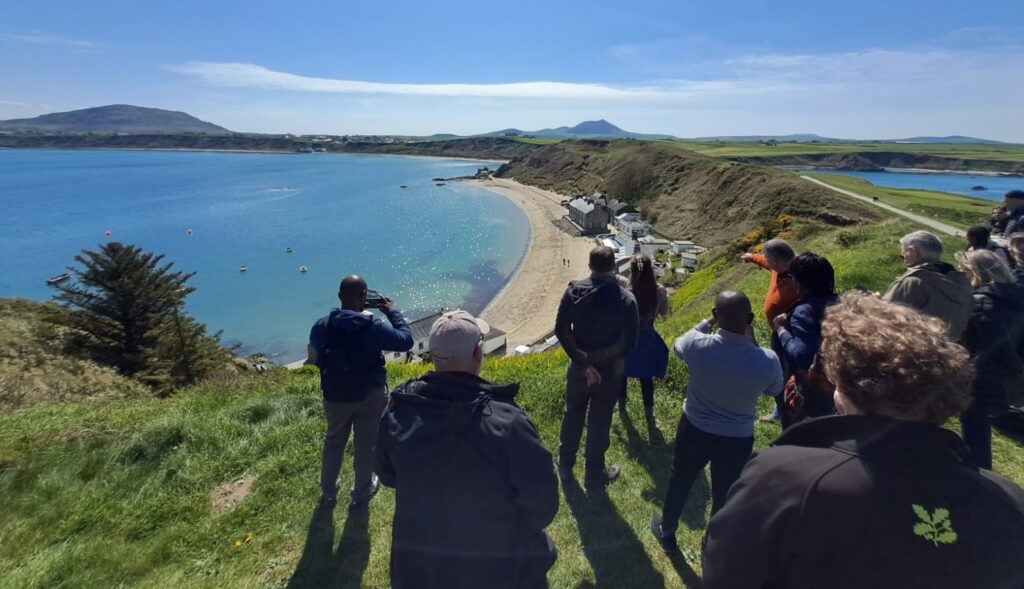
INTO project partners including Zanzibar Stone Town Heritage Society on a visit to Porthdinllaen in April 2023.
Porthdinllaen and Penrhyn Castle are both located on the North Wales coast, over 5,000 miles from Stone Town in Zanzibar, an island off the coast of east-central Africa. Despite the distance between them, the three sites are facing similar challenges relating to a changing climate: rising sea levels, coastal erosion, more extreme and frequent storms, flooding and damp issues.
INTO’s Withstanding Change project brings together the National Trust with five heritage organisations in the Middle East and East Africa, to learn together about how to protect historic places from such hazards. As part of the project, funded by the British Council’s Cultural Protection Fund, National Trust Cymru are working closely with Zanzibar Stone Town Heritage Society (ZSTHS), who are custodians of the Old Customs House, a nineteenth-century Omani-style mansion on the Mizingani seafront in Stone Town – itself designated as a UNESCO World Heritage site in 2000.
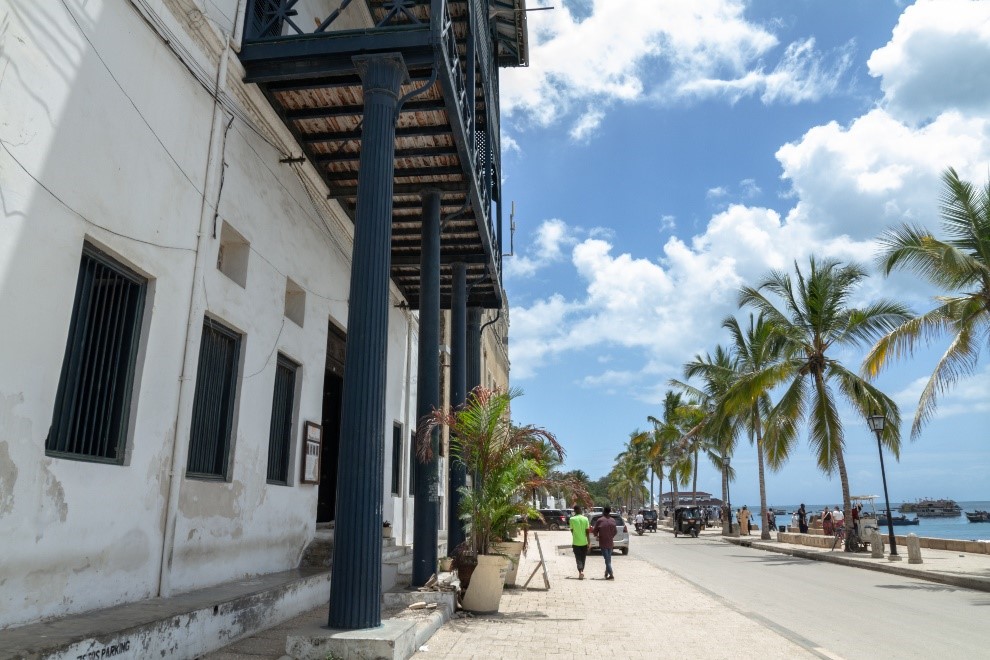
The front façade of the Old Customs House in Stone Town. Photo by Sharida Diaz Gautier.
Hoshil Dhanji, capital works coordinator at ZSTHS, said, ‘The Old Customs House is constantly exposed to increasing humidity and sea salt spray, which deteriorates its external lime-based render and limewash. We’re also seeing increased salt corrosion to metallic building elements, including the corrugated iron roof.’
‘Frequent pluvial floods saturate the foundations, accelerating the capillary rise of moisture-borne salts which evaporate and force the salt particles to the surface of plasters, renders and washes. This causes spalling, flaking and peeling. Increased out-of-season rainfall is preventing the walls from drying out and leading to growth of algae, as well as deterioration of timber elements in the building.’

Makame Juma, CEO of Zanzibar Stone Town Heritage Society, on the seafront in Stone Town. The effects of erosion and salt corrosion can be clearly seen on the facades of the surrounding buildings. Photo by Sharida Diaz Gautier.
Adaptations at Old Customs House have included replacing the roof with corrugated aluminium, which is more resistant to salt corrosion, and applying a desalination treatment to the building’s external render before repairing it using traditional techniques.
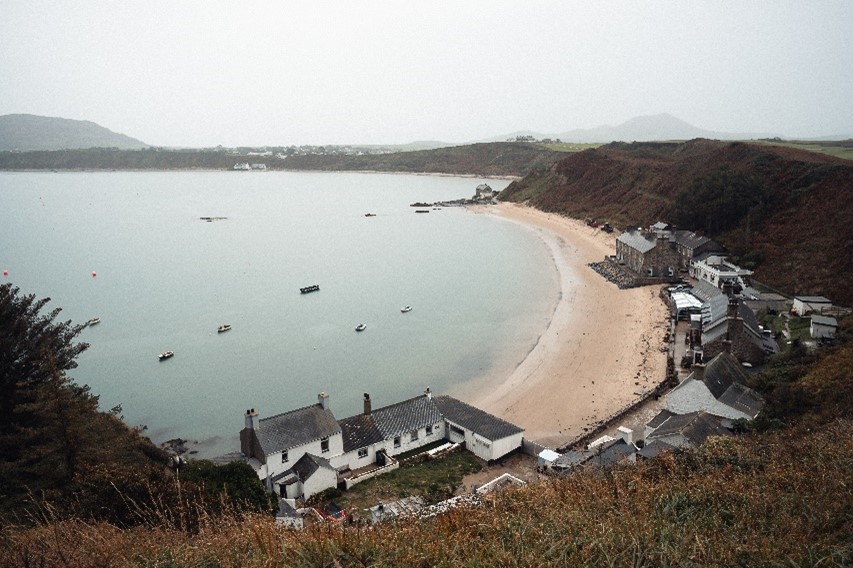
The village of Porthdinllaen on the Llŷn Peninsula. Photo by Phill Boyd.
Meanwhile in Porthdinllaen on the Llŷn Peninsula, the beautiful and very popular village is increasingly threatened by flood waters and by slope failure. Dewi Davies, project manager for National Trust Cymru, told us about some of the adaptations that have already been put in place to help manage this: ‘Over several years we have been working with partners to bolster the village’s resilience against high tides and storms – including installing tidal flood boards and increasing the height of the sea walls along the front – so that when the sea threatens to inundate, properties here will have a fighting chance of defending themselves. The cliffs behind have also been given an engineering makeover – drained and pinned so that when heavy rain falls, the risk of slope failure is greatly reduced.’
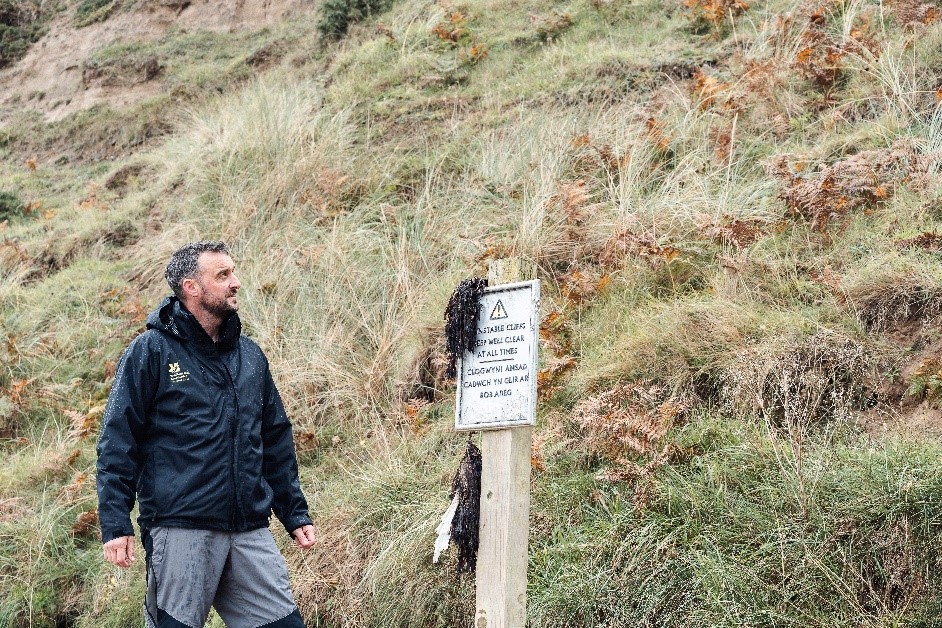
Project Manager Dewi Davies at an area of the Porthdinllaen cliff face prone to slope failure. Photo by Phill Boyd.
Ceri Williams, general manager at Penrhyn Castle along the coast just outside Bangor, also highlighted how working with the Zanzibar team has presented a brilliant opportunity to learn from others and review their own plans for safeguarding the nineteenth-century castle and gardens from climate change. ‘For several years we have been working towards addressing the impacts of climate change on the castle; in particular, the higher levels of water we are seeing on site and the effects of storms. The work that the Zanzibar Stone Town Heritage Society have done with their communities in upskilling people with traditional heritage skills is of particular interest.’
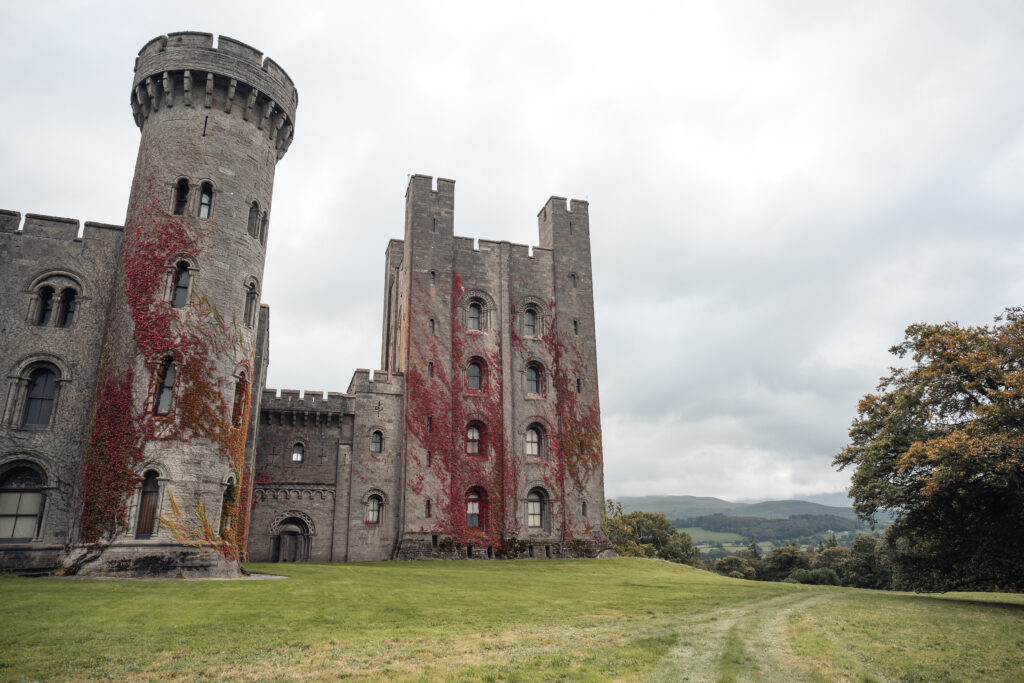
The exterior of Penrhyn Castle, Gwynedd. Photo by Phill Boyd.
‘As Penrhyn Castle is part of the Slate Landscapes of North Wales, a UNESCO World Heritage Site since 2021, I feel we can learn a lot from our partners in harnessing the passion and interest of our local communities whilst ensuring we are embedding the necessary skills in the local area to preserve these globally significant parts of the world.’
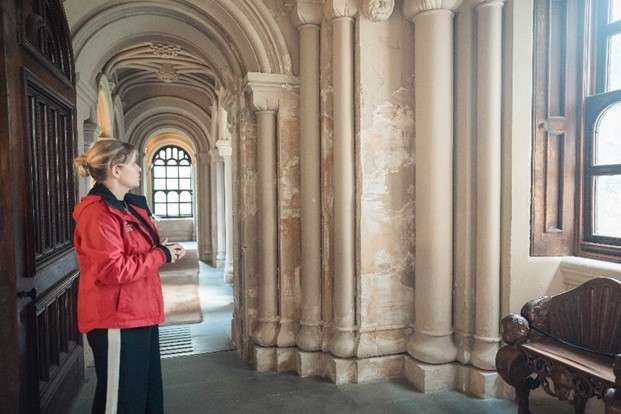
General Manager Ceri Williams points out damage from water ingress in the entrance to Penrhyn Castle. Photo by Phill Boyd.
Following a series of online meetings between the twinned site teams, Richard Pennington, Senior House and Collections Manager at Penrhyn Castle & Gardens, was able to travel out to Zanzibar in October 2024, to learn directly from the ZSTHS team. Richard was particularly inspired by some of the innovative solutions they had come up with to manage rainwater at the Old Customs House, including using a sustainable resinous coating on the building’s flat roof. He’ll be exploring the possibility of applying some of this learning to the building at Penrhyn.
Meanwhile we’ve been inspired by ZSTHS’s efforts to raise local communities’ awareness of the impact of climate change on the places they love, and have developed new interpretation which you can see in the welcome and interpretation huts at Porthdinllaen, and in Penrhyn Castle. We’re also working with gardening experts to understand how to adapt Penrhyn’s walled garden, which is coming under increasing pressure from climate change. Climate projections, plus our knowledge of the site’s unique microclimate, indicate that by the middle of the century we’ll be able to grow mediterranean and sub-tropical plants such as the Canary Island Date Palm, Phoenix canariensis. You could also see succulents such as Aeonium and Furcraea; the tall purple flower spikes of Echium candidcans; perhaps even the South African Protea or Agave americana from Mexico. But whatever climate challenges we face, we’ll always balance changes to our planting schemes with preservation of historic features – ensuring that we retain what makes the walled garden special.
At the National Trust, we believe it’s important not only to mitigate against climate change by working to reduce carbon emissions, but also to adapt, by making historic and beautiful places more resilient to the effects of climate change. For more information, see our landmark report, A Climate for Change.
‘Withstanding Change’ is an International National Trusts Organisation project, funded by the British Council’s Cultural Protection Fund, in partnership with the Department for Digital, Culture, Media and Sport.
